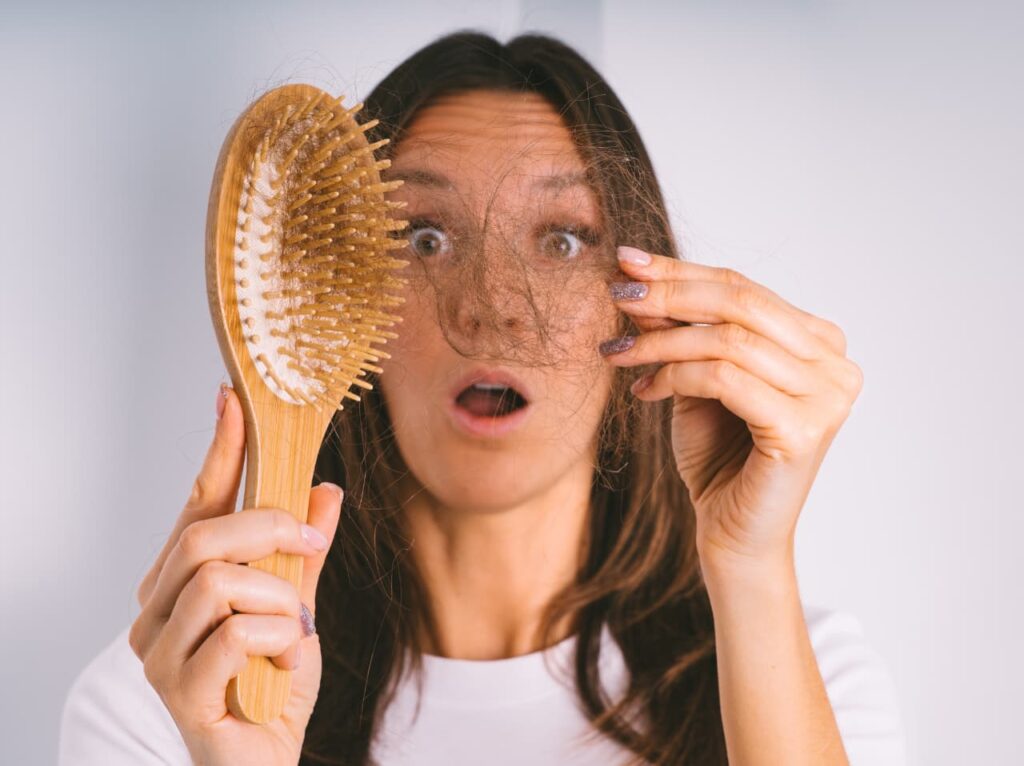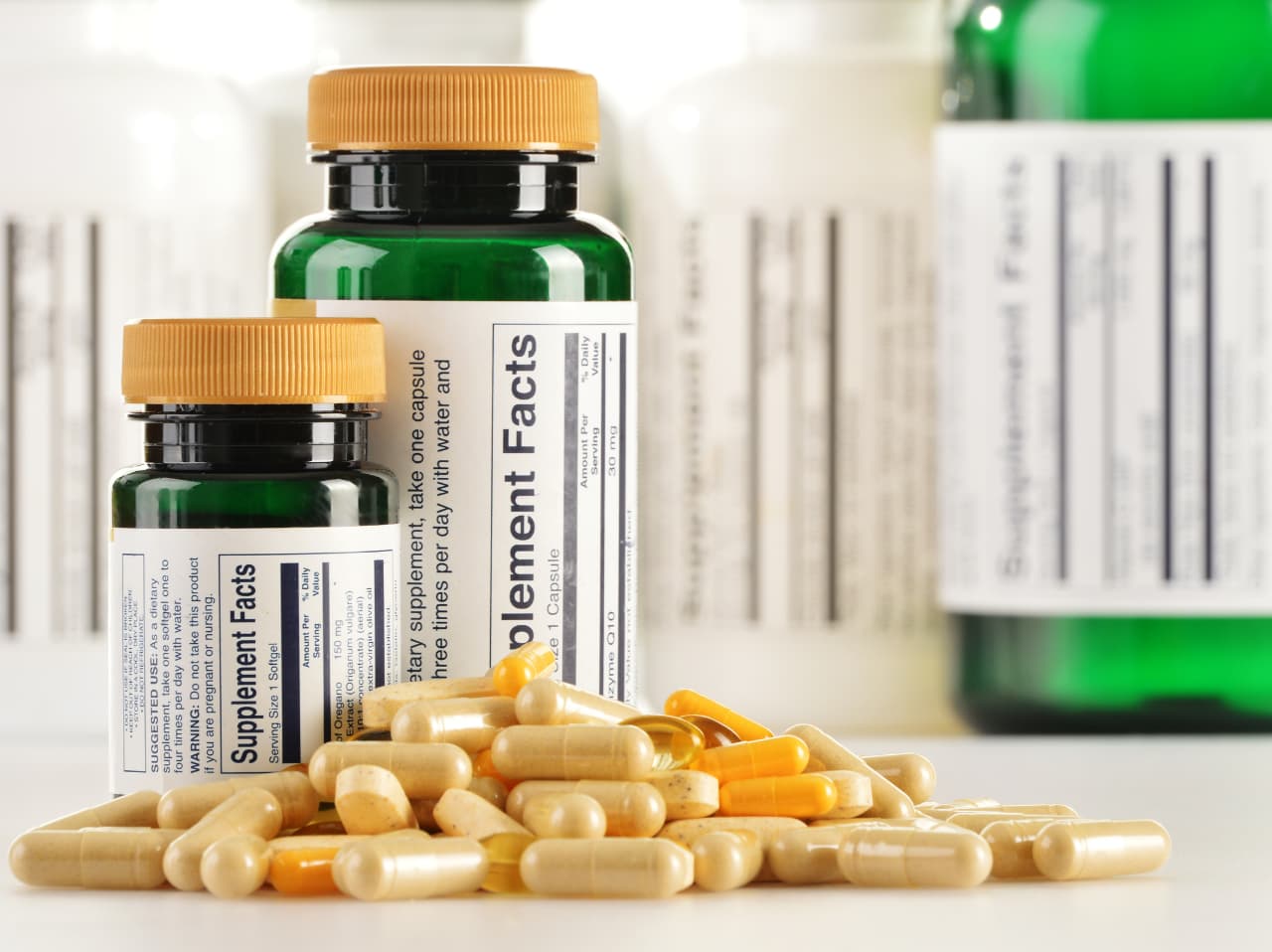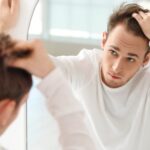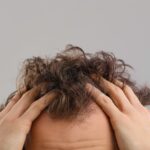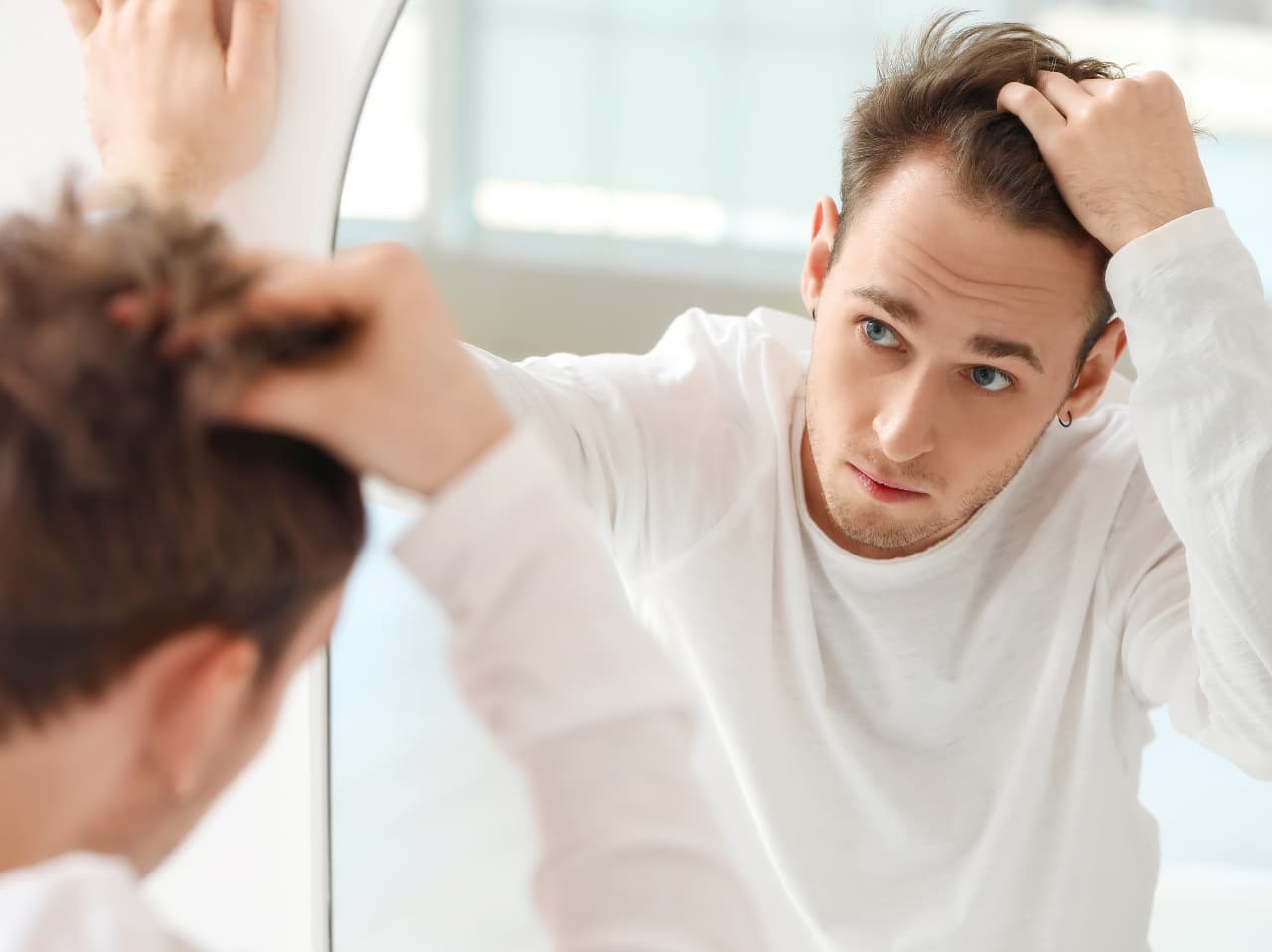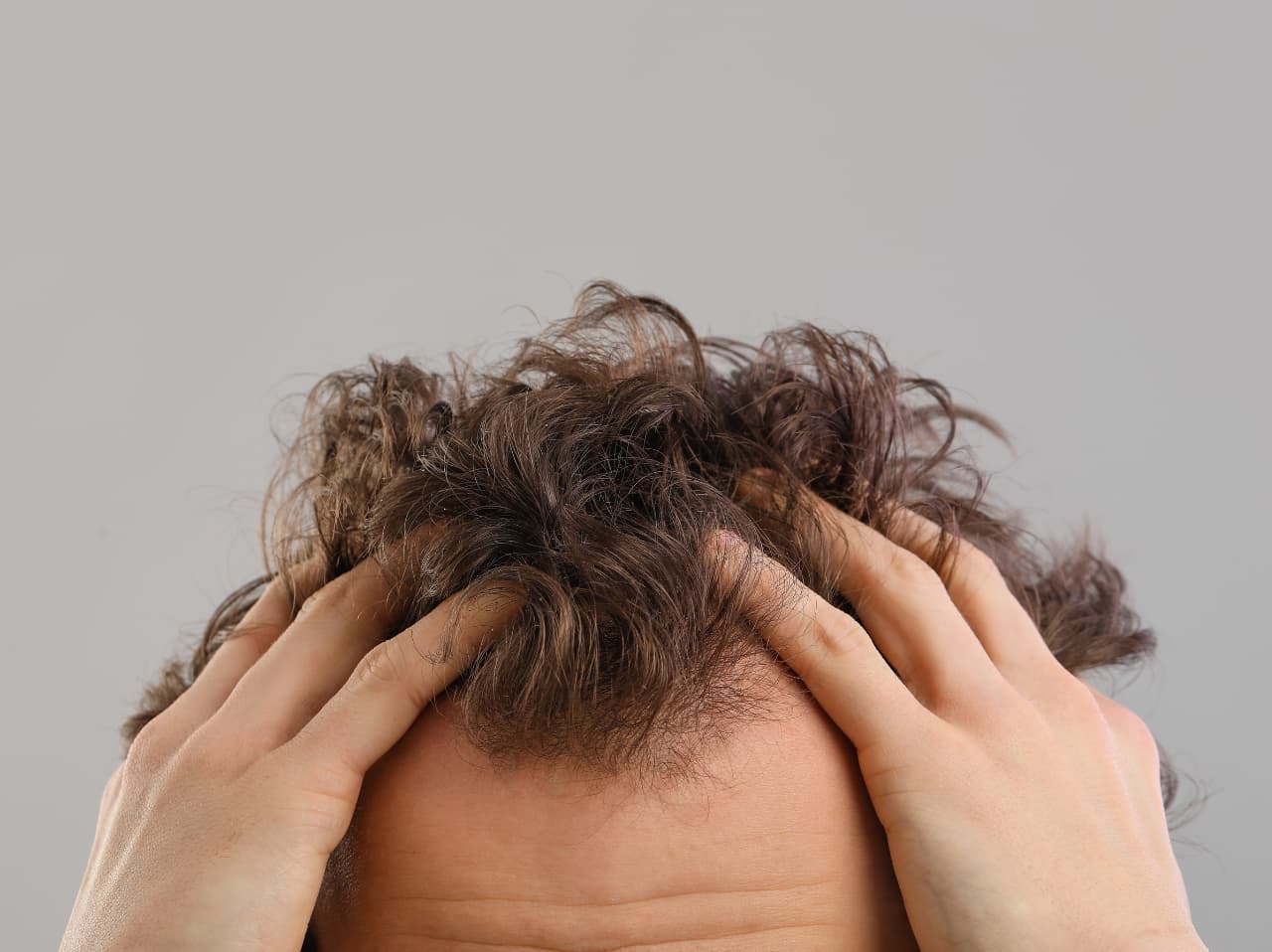Table of Contents
ToggleThe best products for postpartum hair loss gently cleanse the scalp, strengthen weakened strands, and support new growth without harsh ingredients. Recommended options include nutrient-rich shampoos, biotin and collagen supplements, and scalp serums with caffeine or peptides. These products promote recovery, improve thickness, and protect fragile hair as it regrows.
At Kopelman Hair, we understand how emotional postpartum hair loss can be. Our clinic restores confidence through personalized care, helping new mothers achieve fuller, healthier hair. Dr. Ross Kopelman and his team guide patients in choosing the safest and most effective post-pregnancy hair treatments.
Key Takeaways
- Postpartum hair loss is a natural response to hormonal shifts after pregnancy and usually resolves within 6–12 months.
- The most effective products include gentle shampoos, nourishing vitamins, and scalp treatments that strengthen follicles and support regrowth.
- Nutrients such as biotin, iron, and vitamin D help restore healthy hair during recovery.
- Gentle care habits like avoiding tight hairstyles and limiting heat protect hair as it grows back.
- If shedding continues beyond a year, schedule an evaluation.
Understanding Postpartum Hair Loss
Postpartum hair loss is a temporary condition caused by hormonal changes after childbirth. During pregnancy, high estrogen levels keep hair in its growth phase longer, making it appear thicker. After delivery, hormone levels drop, triggering increased shedding three to four months later.
Most women notice extra hair in the shower or on their brush, especially around the hairline. While it can feel alarming, this process is normal and usually resolves within a year.
Why Hormones Trigger Hair Shedding
Hormonal fluctuations are the main cause. High estrogen during pregnancy prevents natural shedding, while estrogen levels drop sharply after birth, pushing follicles into the resting phase.
Stress, lack of sleep, and poor nutrition can make hair loss worse. Women with thyroid issues or low iron often experience more persistent shedding, so a healthcare professional should check for underlying causes.
How Long Postpartum Hair Loss Lasts
Most shedding peaks between three and six months after delivery. By the baby’s first birthday, hair growth typically returns to normal.
For some women, recovery takes longer due to ongoing stress or hormonal imbalance. If hair loss continues beyond a year, consult a hair restoration specialist like Dr. Ross Kopelman to rule out conditions such as telogen effluvium or postpartum thyroiditis.
What to Look for in Postpartum Hair Loss Products
Choose gentle, nutrient-rich products that strengthen hair and nourish the scalp without harsh chemicals.
Key Ingredients to Look For
- Biotin and Collagen: Strengthen the hair shaft and boost elasticity.
- Peptides and Caffeine : Stimulate follicles to encourage new growth.
- Niacinamide and Panthenol: Improve scalp health and circulation.
- Plant Oils : Such as argan, castor, or rosemary oil, reduce dryness and breakage.
Avoid sulfates, parabens, and synthetic fragrances, which can irritate the scalp and weaken fragile strands.
Shampoo for Post Pregnancy Hair Loss
A mild, volumizing shampoo is ideal for post-pregnancy care. These shampoos cleanse gently while protecting natural oils that keep the scalp balanced.
Top-Rated Options
- Rootmd – Hair Growth Shampoo – designed to support healthier follicles, reduce shedding, and improve scalp circulation
- Kérastase Genesis Bain Nutri-Fortifiant – strengthens roots and reduces breakage.
- Vegamour GRO Revitalizing Shampoo – plant-based and safe for sensitive scalps.
- Nioxin System 2 Cleanser – increases circulation for a fuller appearance.
Use lukewarm water, massage your scalp for one to two minutes, and limit washing to every other day to prevent dryness.
The Role of Postpartum Hair Loss Shampoo
A dedicated postpartum hair loss shampoo can minimize shedding and improve texture. These shampoos often contain DHT blockers or growth-stimulating ingredients.
Experts recommend shampoos that combine medical-grade ingredients with botanical extracts. Consistent use supports the regrowth cycle and helps prevent buildup that can clog follicles
The Best Vitamins for Post Pregnancy Hair Loss
Hair growth depends on nutrients that nourish the scalp and support cell renewal. The best vitamins for post pregnancy hair loss include:
- Iron – improves oxygen delivery to hair roots.
- Zinc – supports tissue repair and scalp balance.
- Vitamin D – regulates follicle activity.
- B-Complex Vitamins (Biotin, B12) – promote strength and shine.
Postpartum multivitamins often combine these nutrients safely for breastfeeding mothers. Always check with your doctor before starting supplements.
Nutrition and Dietary Support
A balanced diet strengthens hair and speeds recovery. Focus on foods rich in protein, omega-3s, and antioxidants.
Healthy Food Choices
- Eggs and lean meats for biotin and iron.
- Spinach and lentils for iron and folate.
- Salmon and chia seeds for omega-3 fatty acids.
- Berries and nuts for antioxidants.
Stay hydrated by drinking at least eight glasses of water a day to maintain scalp moisture.
Safe Treatments While Breastfeeding
Breastfeeding mothers should be cautious with hair loss treatments. Avoid topical Minoxidil unless approved by a doctor.
Safe Alternatives
- Nutrient-based supplements made for postpartum women.
- Low-level laser therapy (LLLT) devices that stimulate follicles.
- Scalp massages using lightweight oils like jojoba or rosemary.
Kopelman Hair tailors every treatment based on medical history, breastfeeding status, and scalp condition.
Common Myths About Postpartum Hair Loss
Myth 1: Cutting hair short prevents shedding.
Fact: Shedding happens at the follicle level, not because of hair length.
Myth 2: Hair won’t grow back after childbirth.
Fact: Most women see regrowth within a year, though texture or volume may change slightly.
Myth 3: Special shampoos alone can stop hair loss.
Fact: Topical care helps, but overall health and hormone balance matter more.
When to Seek Professional Help
If hair loss lasts longer than a year, appears patchy, or causes scalp irritation, seek expert evaluation.
Dr. Ross Kopelman can perform diagnostic imaging and scalp analysis to find the cause. Treatments may include PRP therapy, medical-grade topicals, or laser therapy to reactivate follicles.
Preventive Habits for Healthier Regrowth
Gentle daily habits protect new growth and prevent breakage.
Helpful Practices
- Avoid tight hairstyles.
- Use silk pillowcases to reduce friction.
- Limit heat styling tools.
- Detangle wet hair with a wide-tooth comb.
Regular trims also help maintain healthy ends during regrowth.
Emotional Impact and Support
Hair loss after pregnancy can affect confidence and mood. Understanding that this phase is temporary helps ease anxiety.
Expert Insight from Dr. Ross Kopelman
While postpartum shedding is normal, long-term thinning may indicate other issues. His expertise in hair restoration ensures safe, evidence-based care that promotes lasting regrowth.
Final Advice
Postpartum hair loss improves with the right products, nutrition, and professional care. Stay consistent with your routine and focus on scalp health to encourage recovery.
If you’re struggling with postpartum shedding, contact Kopelman Hair to schedule a consultation and explore customized solutions backed by decades of medical expertise.


